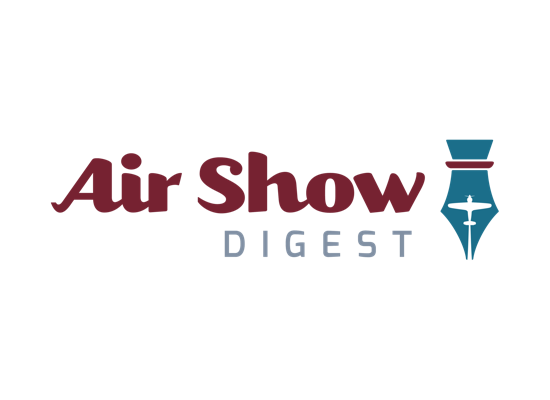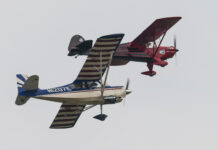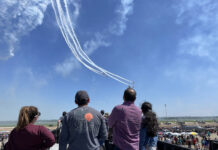As global economies struggle to recover, air show organizers and performers are taking note by adjusting one of their most valuable sponsorship tools: hospitality. While some performers and shows have toned down the extravagance of chalets, the core benefit remains for companies looking to connect with their customers, employees or communities.
The traditional banners blanketing air shows typically bolster a company’s brand locally, but rarely drive tangible results. “In a world of voice and text messages, a handshake and smile are rare, especially when it’s coming from the face who is running the company,” explains performer Michael Goulian, who now travels with a VIP trailer, which offers a unique air show experience for his sponsor, Whelen, and its customers. “When they can feel the excitement of the air show and associate it with your brand, it makes the purchasing decision that much easier.”
Customer appreciation is also the cornerstone of Oracle’s long-time sponsorship program with performer Sean D. Tucker. Team Oracle’s Director of Corporate Sponsorship Lyndi Taylor says Oracle targets senior level executives within a 60-mile radius of the air show. “We find that 92 percent of our guests have never been to an air show and corporate hospitality allows our guests to relax without worrying about their children,” she says. For many people, an air show and, specifically, a corporate chalet are their only exposure to aviation and its history. Taylor believes shows that do not offer corporate hospitality are missing an opportunity to expand their sponsorship support. “You can’t sponsor something if you haven’t touched and experienced it.”
With recent changes to U.S. Air Force policy, bases can now offer hospitality to local and national businesses during their air show/open house as part of a broader sponsorship package as long as hospitality deals are agreed to in a separate contract with Services. For performers like Tucker, the change has made a significant impact on his program. “This year, we are able to host as many customers as we need with our own tent on the flightline compared to past years when chalets weren’t allowed,” explained Taylor. “Now, I can go to Oracle and say we have everything we need to be successful.”
At Air Force bases, the policy change that permits use of hospitality chalets has been embraced by Services personnel who see the change as an opportunity to improve the value-added elements of the show and develop a new air show-based profit center. Even as they work through the growing pains of implementing this new chalet policy for the first time at many bases, the Air Force is identifying success stories that they hope to use to shorten the learning curve for other bases.
As an example, the Services personnel at Luke Air Force Base conducted some market research by talking with their counterparts at MCAS Miramar and by visiting some non-air show events in the Phoenix area. They used that information to develop a program that provided individual access to a large, general public-oriented hospitality area at a cost of $90 per person. During the course of their air show this March, they sold 450 tickets to this “Thunder Club” hospitality chalet. Luke also offered local businesses an opportunity to buy their own chalets at a cost of $10,000 for a large (40’ x 60’) and $5,000 for a small (40’ x 30’). For both the public and corporate chalets, Services provided patio seating, breakfast, lunch, finger food/fruit in the afternoon, non-alcoholic drinks, a cash bar, and reserved parking on the base about a quarter mile from the chalet area.
“This is an opportunity the Air Force really needs to take advantage of because the money generated can help the airmen,” says Steve Winkleblech, who helped organize this new hospitality initiative on behalf of Luke’s 56th Force Support Squadron. “It’s a great way to work with people downtown [in nearby Phoenix] and promote what we do.”
Two months later, Services personnel working with the Joint Services Open House at Andrews Air Force Base in Washington, DC used the experiences of their colleagues at Luke to develop a single, large general hospitality area (210’ x 100’) that contained a 210’ x 30’ tent for catering, which included a hot breakfast, lunch and afternoon snacks. Businesses were charged $100 per person for access to the hospitality tent. A similar, general public-oriented tent nearby had an admission price of $90 per adult, $45 for children.
Success is still defined by a sponsor’s requirements and, although some shows have tempered extravagant displays, the basics of a good hospitality program remain the same. Taylor tries to create an oasis on the flightline without going overboard. “When the economy crashed, we had to be respectful and not spend $60 on a floral arrangement when people were trying to find money to buy software.”
This new frugality doesn’t only extend to the décor, but to the food, as well. For Oracle, Taylor works with the Services/MWR (at Air Force bases) or the show’s caterer to provide quality, simple food such as hot dogs, hamburgers and salads. “We’re not a golf event, so we’re not going to serve salmon,” Taylor explains. “We’re also sensitive to dietary requirements in what we offer.”
But don’t make the mistake of thinking basic catering means basic presentation or facilities. Team Oracle and Goulian still require table linens, chafing dishes and — most importantly — clean, air conditioned bathrooms. While Goulian’s rig contains its own restrooms, Taylor says construction site-type porta-potties are not acceptable. The good news for air shows: VIP restrooms are now more accessible and affordable for shows of all sizes.
The California International Air Show in Salinas offers a President’s Chalet that has long been the gold standard for hospitality in the air show business, with local high-end restaurants providing the majority of food for President’s Chalet guests. “We’re able to offer our premium ticket holders exceptional food ranging from meat stations, pasta bars, and Mexican food to fresh seafood, local produce and dessert bars, and more,” said show board member Karen Curtis.
Salinas also offers a more affordable option with The Flight Deck chalet for the air show fan who wants something more than a general admission or grand stand ticket. She explained, “We have patterned our Flight Deck after our President’s Club tent, but on a smaller scale. Instead of several restaurants, we’ll use one. Instead of a hosted bar, there is a no-host bar.”
The overall hospitality experience wouldn’t be complete without access to preferred or VIP parking, as well as to the performers or stars of the show. Not only should you offer special parking for your guests; it should be located close to the chalet area with its own entry to the show grounds when possible. If the parking is at a distance, arrange golf cart transportation to pick up and return your guests to their vehicles. Taylor added, “Little things like a golf cart make a huge difference and add to the VIP experience because a CIO [chief information officer] is not going to stand in the heat and park a half-mile away.”
Chalet attendants who have been empowered with the basic show knowledge and who can solve the little problems can make a big difference in your overall success. “Are your volunteers at check-in trained to be efficient and pleasant? Do you have anyone roaming your tent to see if your guests need anything?” Curtis added, “Ultimately, the way that great hospitality can be measured is whether or not your guests felt important and special while they were in your care.”
Creating that environment starts by delivering detailed parking maps with clear instructions, parking passes, chalet tickets or credentials ten days or more before the show. This gives sponsors time to review your material, add their own elements, and send a customized hospitality package to their guests. Curtis explained, “Ultimately, the goal is to introduce general aviation and the quality/precision of the military to everyone. By offering many levels of hospitality within our show, we are able to do that.”
Basic or elaborate, hospitality chalets can generate additional revenue, enhance community relations, or grow your sponsorship base. Creating an incredible air show experience through a high quality hospitality experience might also just introduce a whole new fan base to the aviation community.
Bonus #1: Sample list of Team Oracle Chalet Requirements
Location: as close to show center as possible
Tickets: 100 adult passes/tickets with children under 5 free
VIP parking: 30 VIP parking passes per day as close to chalet as possible
VIP toilets: executive/air-conditioned toilets near chalet
Chalet logistics: clean, white tent (minimum 20’ x 45’) with barrel covers if tent has barrel as hold downs.
Side walls on three sides of the tent (the entrance side and the two sidewalls with the side facing the flight line open). Tables: eight (8) 60″ round tables; three (3) highboy/cocktail tables; seven (7) 8′ rectangular tables; four (4) buffet tables; and one(1) bar with two (2) rectangular tables for Team Oracle registration and supplies. Chairs: 125 white padded chairs with six (6) set at each of the 60” round tables and the remaining chairs set in theater style, close to and facing the flight line. Linens: changed out each day, black with skirts for buffet table, bar and Team Oracle tables; red for rounds and highboys. Trash: recycle container for plastics and cans
Set-up: Friday at noon
Tear down: two hours needed after show to pack up chalet supplies
Tickets and lanyards: supplied by Team Oracle
Catering: Team Oracle colors are black, red and white. Linens must be black with skirting for all rectangular tables; red, 60” lap length for all rounds; and red, 90″ for all highboys.
Continental breakfast for 30 guests: coffee, juice, water, fresh fruit, bagels and cream cheese, Danish, muffins.
Lunch for 75 adults and 25 children under 10: hot dogs, hamburgers, sausage (with peppers and onions), Lay’s brand potato chips, original coleslaw, watermelon slices, assorted cookies (please put these out one hour after lunch is served). Add-ons: vegetarian option, vegetable tray with dip, fresh fruit. Beverages: ice tea, lemonade, water.
Bonus #2: Changing the Culture of Air Show Business: Improving Air Show Hospitality
As the air show community continues to improve and expand its capacity to offer corporate-level hospitality at air shows, it’s useful to know that there are resources available to help make that transition easier. Indeed, the ready availability of luxurious mobile chalets have, in part, contributed to the expectation among corporate sponsors that they can participate in outdoor events in comfort. They are now used at tennis and golf tournaments, car and boat races, concerts, and other outdoor sporting and festival events. And, over time, the more elaborate hospitality options at these other venues have increased pressure for air shows to offer more than the traditional tents and construction site-style porta-potties.
“Expectations have changed,” says ICAS President John Cudahy. “At some point, our industry must choose between making small additional investments in hospitality infrastructure or losing access to prospective corporate sponsors.”
Michael Goulian and his team at Goulian Aerosports have risen to that challenge. Goulian has identified outstanding corporate hospitality as a critical element of his performer sponsorship programs, first with Castrol and, more recently, with Whelen Engineering. To help them provide their clients with the quality entertainment experience that they and their customers expect, Goulian Aerosports has begun making regular use of the F1 Hospitality mobile chalet.
The tractor trailer-type rig is air conditioned with a private bathroom, food preparation area, upholstered seating, and hard-mounted plasma televisions. Outside, awnings can create an outdoor, shaded area on both sides of the trailer. Flush-mounted big screen television units project air show and sponsor-related video images under the awning all day. The unit comes with a full complement of seating, table linens, food service equipment, and outdoor flooring.
“We like it because it demonstrates that air show professionals can operate at the level of sophistication and quality that Corporate America expects,” says Goulian. “My sponsor knows that they can bring their guests out onto the ramp without sacrificing professionalism or comfort.”
Christina Carey, special project manager for the Ft. Worth Alliance Air Show, has put the same unit to use at her show. “Whether you are looking to conduct business, entertain clients or promote your brand and identity at an outdoor event, the trailer is perfect way to do it in style, with class and at a cost that is comparable to a traditional chalet,” says Carey.
“It’s a chicken vs. egg thing,” says Cudahy. “Attracting more corporate sponsorship money will require that air shows make this kind of investment. But many air shows and performers don’t want to make that small additional investment until they’ve signed that sponsor. Eventually, the business has to make the kind of leap of faith that Goulian and Ft. Worth Alliance have made.”








